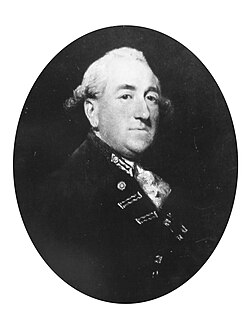Related Research Articles

Francis William Drake was an officer of the Royal Navy. He served during the War of the Austrian Succession, the Seven Years' War and the American War of Independence, rising to the rank of vice-admiral of the red.
Wigtown Burghs, also known as Wigton Burghs,. was a constituency of the House of Commons of the Parliament of Great Britain from 1708 to 1800 and of the House of Commons of the Parliament of the United Kingdom from 1801 to 1885. It was represented by one Member of Parliament (MP).

Richard Pennant, 1st Baron Penrhyn, was a Welsh politician and nobleman who served as an MP in the British Parliament, representing Petersfield and Liverpool for 29 years between 1761 and 1790. He was the owner of Penrhyn Castle, an estate on the outskirts on Bangor, North Wales.
This is a list of people who have served as Lord Lieutenant of Sligo.

John Morton was an English lawyer and Tory politician who sat in the House of Commons between 1747 to 1780.
Radnor or New Radnor was a constituency in Wales between 1542 and 1885; it elected one Member of Parliament (MP) to the House of Commons of the Parliaments of England (1542–1707), Great Britain (1707–1800) and the United Kingdom (1801–1885), by the first past the post electoral system. In the Redistribution of Seats Act 1885, the division was merged into Radnorshire.
Midhurst was a parliamentary borough in Sussex, which elected two Members of Parliament (MPs) to the House of Commons from 1311 until 1832, and then one member from 1832 until 1885, when the constituency was abolished. Before the Great Reform Act of 1832, it was one of the most notorious of England's rotten boroughs.

Sir Samuel Fludyer, 1st Baronet, of Lee Place in Kent, was an English merchant and banker who served as a Member of Parliament and Lord Mayor of London.

Bamber Gascoyne of Childwall Hall, Lancashire (1725–1791), was an 18th-century English politician who sat in the House of Commons of Great Britain between 1761 and 1786.

Sir Nicholas Bayly, 2nd Baronet, was a British landowner and Member of Parliament.

Thomas Lewis, of Harpton Court, near Radnor was a British politician who sat in the House of Commons for 46 years from 1715 to 1761.
Rose Fuller FRS was a West Indies plantation owner and politician who sat in the House of Commons from 1756 to 1777.

Rear-Admiral John Leveson-Gower was a Royal Navy officer and politician from the Leveson-Gower family. As a junior officer he saw action at the Battle of Lagos in August 1759 during the Seven Years' War. As captain of HMS Valiant he was present at the Battle of Ushant on 17 July 1778 during the American War of Independence. He went on to be a junior Lord of the Admiralty and then First Naval Lord. He also sat as Member of Parliament for several constituencies.
Lieutenant-General George Boscawen was a British Army officer and politician, the fourth son of Hugh Boscawen, 1st Viscount Falmouth.
Colonel Joshua Edward Cooper was an Irish landowner and politician from County Sligo.
Joshua Cooper was an Irish landowner and politician from County Sligo.
Lewis Thomas Watson, 2nd Baron Sondes, was a British Whig politician and peer.
Henry Finch was a British academic and politician who sat in the House of Commons from 1724 to 1761.
Frederick Vane was a British politician, the second son of Henry Vane, 1st Earl of Darlington. He sat on the family interest for County Durham from 1761 to 1774, and took an active part in debates over the British East India Company in 1773.
References
- ↑ "House of Commons". Leigh Rayment. Archived from the original on 3 December 2011. Retrieved 2 August 2010.
{{cite web}}: CS1 maint: unfit URL (link) - ↑ "LEWIS, Edward, of Downton, Rad". History of Parliament Online. Retrieved 3 December 2017.